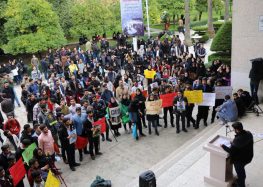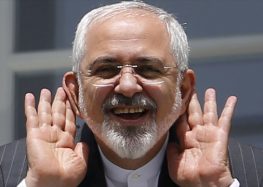Majid Tavakoli
UPDATE: (3 June 2009) Majid Tavakoli has been released from prison.
UPDATE: (18 March 2009) Majid Tavakoli, a student activist, was detained on 5 February 2009, at a ceremony to honor Mehdi Bazargan, the first Iranian prime minister after the revolution of 1979. He is reportedly being held in Evin Prison and is under interrogation.
UPDATE: (September 4, 2008) Majid Tavakoli was conditionally released from Evin Prison on 13 August 2008.
Majid Tavakoli, arrested on May 9, 2007, is a student at Tehran’s Amir Kabir University and a member of the central council of the university’s Islamic Association.
Security forces arrested Tavakoli, Ehsan Mansouri, and Ahmad Ghasaban along with five other students following a week of unrest at Amir Kabir University in May 2007. Although a court acquitted them of charges brought against them and ordered their immediate release on December 24, 2007, prison authorities have refused to free them.
On May 1, 2007, copies of four student publications, Rivar, Sarkhat, Atieh, and Yeksan were distributed throughout Amir Kabir University, containing articles and caricatures deemed insulting to government officials. The appearance of the controversial publications coincided with student elections for the Islamic Association. The editors of the four publications immediately disavowed any involvement in printing and disseminating them. They expressed their shock and said their publications’ logos were faked to produce these counterfeit issues. In a letter to the head of the Judiciary, Ayatollah Mahmoud Hashemi Shahroudi, on May 2, 2007, the editors strongly condemned the content of the fake publications and asked Shahroudi to investigate and prosecute those responsible.
However, the authorities arrested the editors of the publications along with four other students, accusing them of responsibility for their publication.On May 3, 2007, plain-cloths security agents arrested Ahmad Ghasaban, editor of Sahar, as he was planning to file a complaint with judicial authorities. On May 9, Majid Tavakoli, member of the central council of Amir Kabir’s Islamic Association was summoned to the Revolutionary Court in Tehran and subsequently arrested. Ehsan Mansouri, political secretary of the Islamic Association at Amir Kabir University, was arrested after security agents raided his parent’s house on May 29, 2007. The authorities also arrested five other students during the same period who were subsequently released. The prosecutor brought charges of “propaganda against the state,””insulting the Supreme Leader,” and “insulting sacred beliefs” against Ghasaban, Ehsani, and Tavokoli.
During their detention, interrogators have subjected the three students to severe physical and psychological abuses, according to letters sent out of the prison by the detainees as well as public statements by their families.
After sending three letters to the head of the Judiciary, Ayatollah Mahmoud Hashemi Shahroudi, the families of the three detained students wrote a fourth letter to him detailing ill-treatment and torture of the detainees on July 24, 2007. These included: simultaneous physical assault by seven interrogators resulting in loss of consciousness and transfer to the medical ward; continuous interrogation session lasting 24 hours; threats to kill detainees and their family members;, beatings using electric cables;withholding meals for up to 48 hours; and other ill-treatment aimed at obtaining coerced confessions.
On August 13, the three detainees, in letters written inside prison, reiterated that they had no role in printing and disseminating the fake publications, and that under sever ill-treatment they have been forced to make false confessions.
Tehran’s prosecutor general, Saeed Mortazavi, summoned the detainees families to his office on August 19, telling them: “I have warned you many times not to speak publicly about the case and not to give interviews to the media. But you continue to do so. I have ordered [prison authorities] to transfer your children to solitary confinement and to bar any phone calls or personal visits.” He also referred to accusations that the detainees have been tortured, by telling their families: “Who says they have been tortured? I must determine if it is torture and I say it is not. We have not implemented torture yet, so you know what torture means!” He also insisted that the three detainees had confessed to their role in issuing the fake student publications.
The Sixth Branch of the Revolutionary Court in Tehran commenced hearings against Ghasaban, Tavakoli, and Mansouri on September 22. The students’ lawyer, Mohammad Dadkhah told reporters that the prosecution did not present any incriminating evidence except for the confessions obtained after torture in detention. During their testimony to the court on September 29, the students confirmed that their confessions were obtained under duress and are false. Nevertheless, the presiding Judge Babaii found the students guilty of charges and sentenced them to lengthy prison terms on October 15.
For the crime of “propaganda against the state,” Judge Babaii sentence Tavakoli and Ghasaban to one year in prison. He sentenced Mansouri to six months imprisonment on a similar charge.
For the crime of “insulting the leader,” Judge Babaii sentenced Tavakoli to two years imprisonment and Ghasaban and Mansouri to one and a half years.
The judge also disqualified his court from considering the charge of “insulting sacred beliefs” and referred the case to a public court. On November 11, 2007, Tehran’s public court convened a trial for the students. After the trail, the student’s lawyer said the charges discussed in court included “insulting the sacred beliefs,” as well as “insulting the president.” After holding three sessions, the public court announced its decision on December 18. It dropped charges against the three detainees and acquitted them. In addition the court set bail in amount of 800 million Rial ($88,000) for each of the detainees.
Although the families of detainees posted bail shortly after the public court’s decision, prison authorities have refused to release the students. Officials in the judiciary insist that both cases are referred to appeals court and they will not release the students, regardless of the fact that one of their own judges has ordered their release by issuing and collecting bail.





